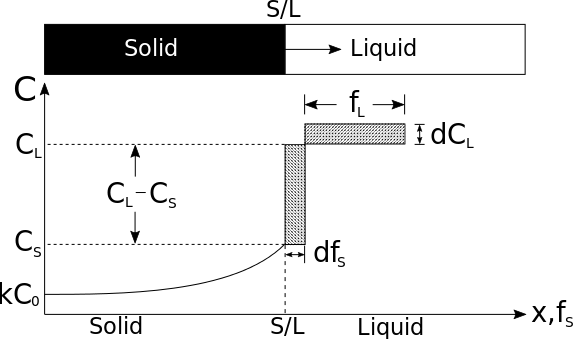Scheil equation
In metallurgy, the Scheil-Gulliver equation (or Scheil equation) describes solute redistribution during solidification of an alloy.[1]
Assumptions
Four key assumptions in Scheil analysis enable determination of phases present in a cast part. These assumptions are:
- No diffusion occurs in solid phases once they are formed (
 )
) - Infinitely fast diffusion occurs in the liquid at all temperatures by virtue of a high diffusion coefficient, thermal convection, Marangoni convection, etc. (
 )
) - Equilibrium exists at the solid-liquid interface, and so compositions from the phase diagram are valid
- Solidus and liquidus lines are straight segments
It should be noted that the fourth condition (straight solidus/liquidus segments) may be relaxed when numerical techniques are used, such as those used in CALPHAD software packages, though these calculations rely on calculated equilibrium phase diagrams. Calculated diagrams may include odd artifacts (i.e. retrograde solubility) that influence Scheil calculations.
Derivation

The hatched areas in the figure represent the amount of solute in the solid and liquid. Considering that the total amount of solute in the system must be conserved, the areas are set equal as follows:
 .
.
Since the partition coefficient (related to solute distribution) is
 (determined from the phase diagram)
(determined from the phase diagram)
and mass must be conserved
the mass balance may be rewritten as
 .
.
Using the boundary condition
 at
at 
the following integration may be performed:
 .
.
Integrating results in the Scheil-Gulliver equation for composition of the liquid during solidification:
or for the composition of the solid:
 .
.
References
- ↑ Xiong, M.; Kuznetsov, A.V. (1 January 2001). Flow, Turbulence and Combustion 67 (4): 305–323. doi:10.1023/A:1015291706970. Missing or empty
|title=(help)
- Gulliver, G.H., J. Inst. Met., 9:120, 1913.
- Kou, S., Welding Metallurgy, 2nd Edition, Wiley -Interscience, 2003.
- Porter, D. A., and Easterling, K. E., Phase Transformations in Metals and Alloys (2nd Edition), Chapman & Hall, 1992.
- Scheil, E., Z. Metallk., 34:70, 1942.
- Karl B. Rundman Principles of Metal Casting Textbook - Michigan Technological University
- H. Fredriksson, Y. Akerlind, Materials Processing during Casting, Chapter 7, Wiley:Hoboken, 2006.

